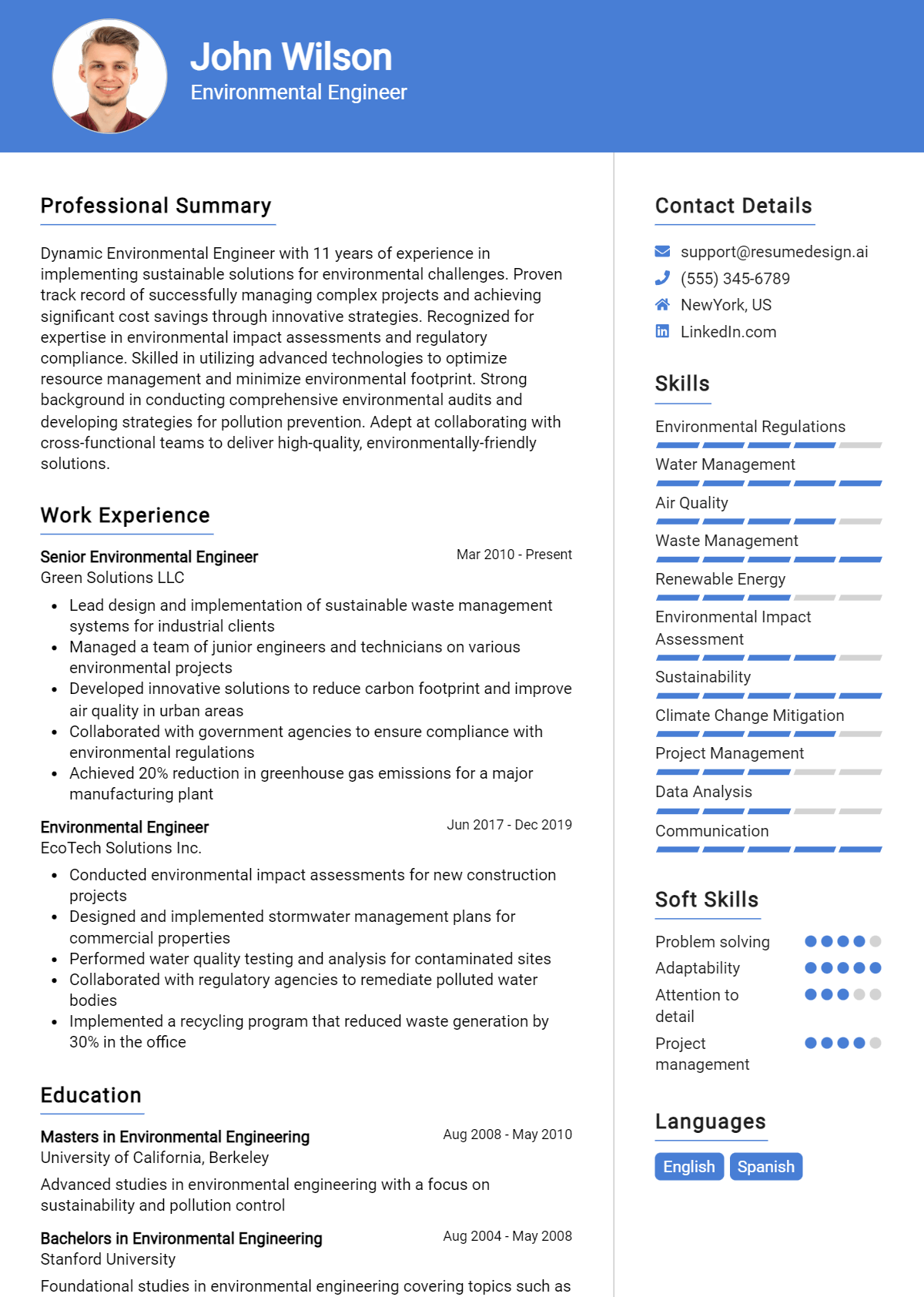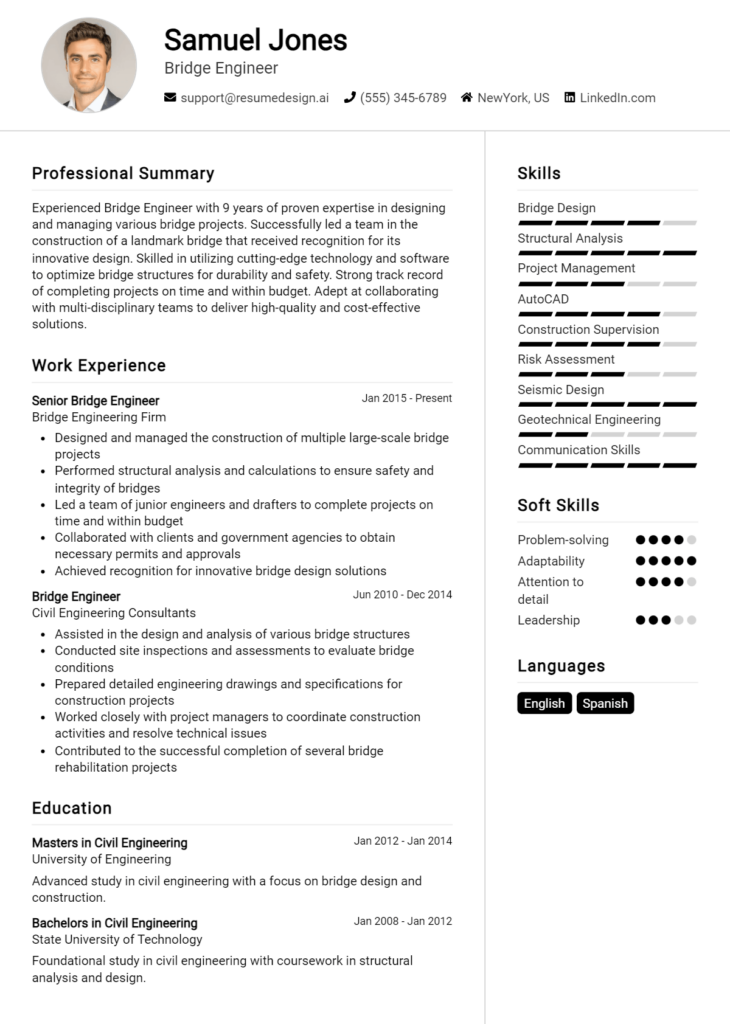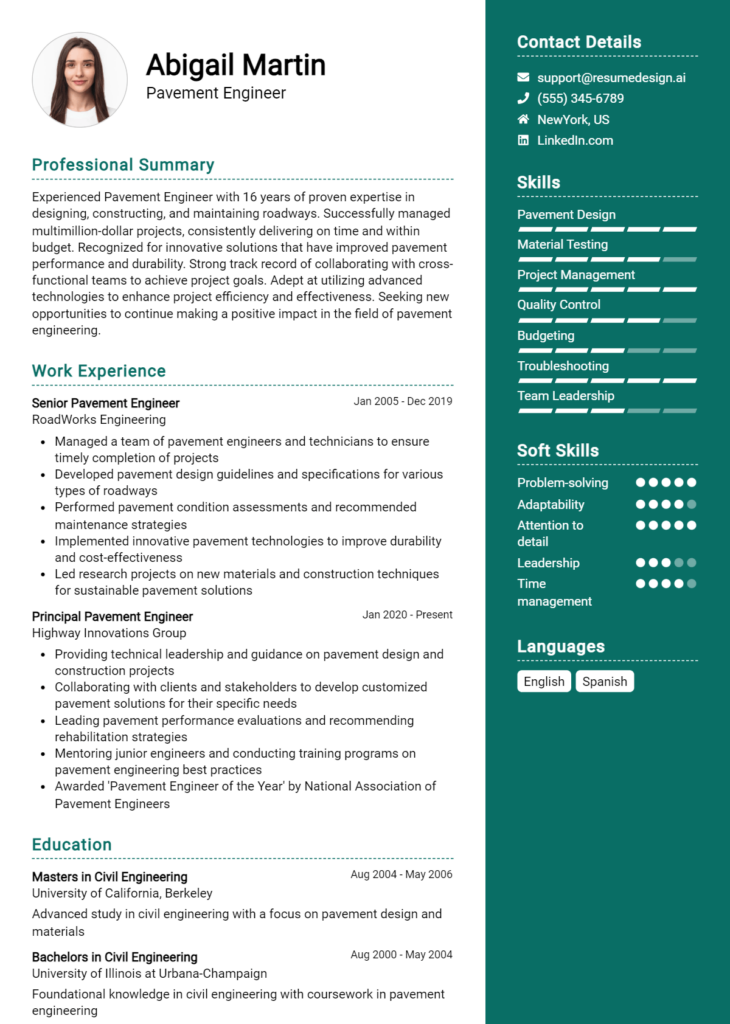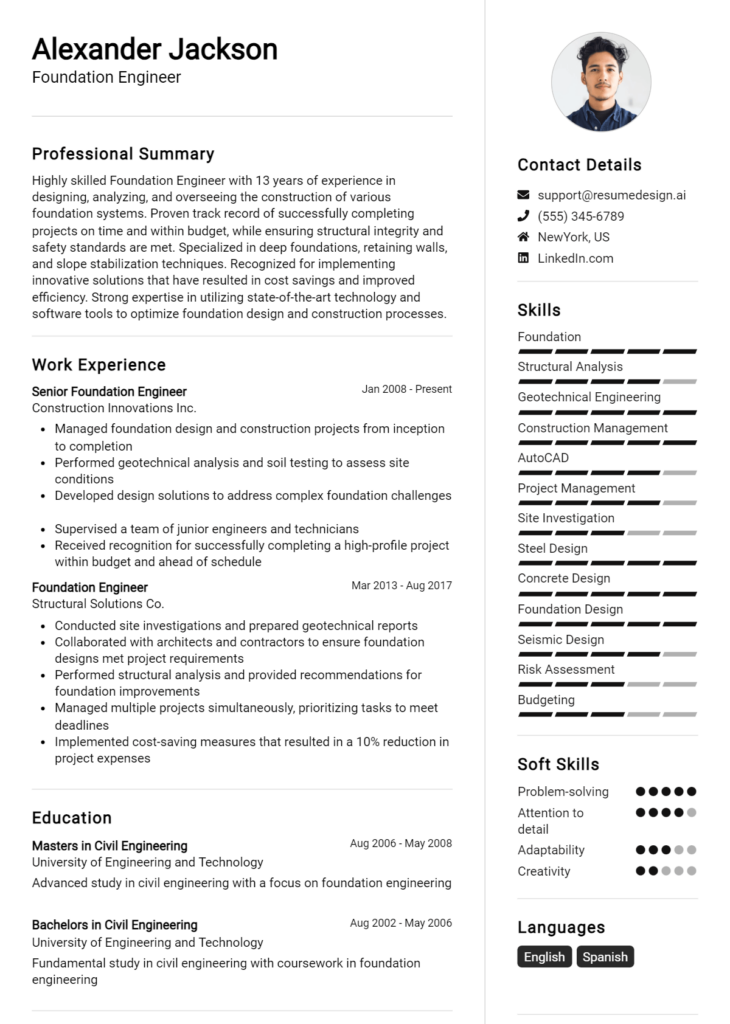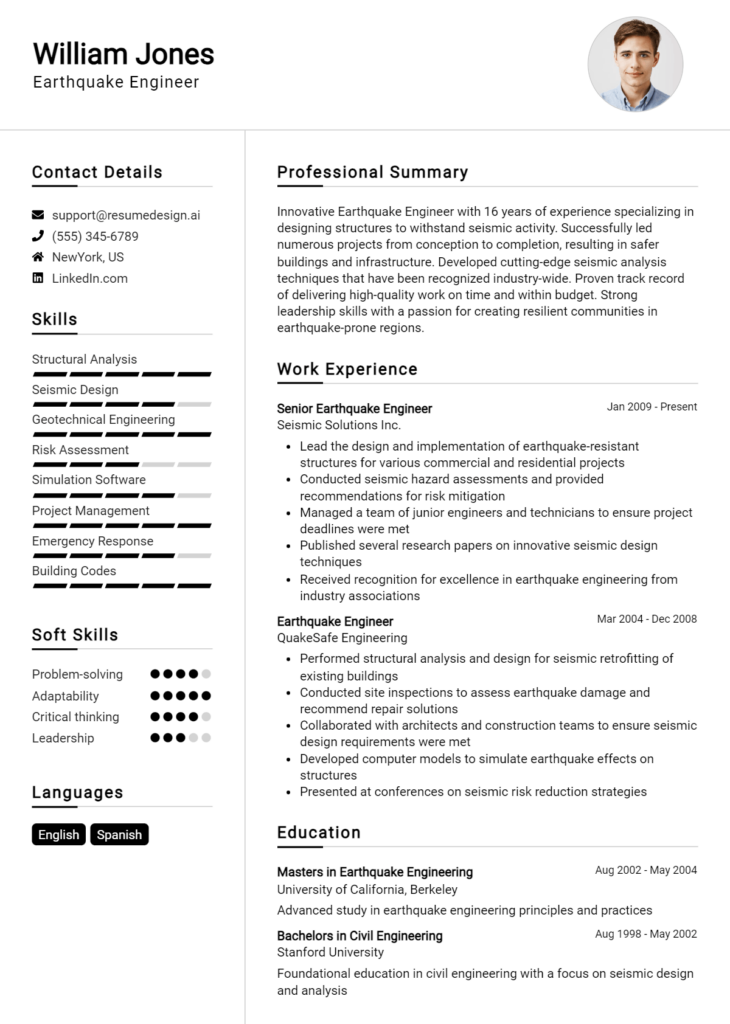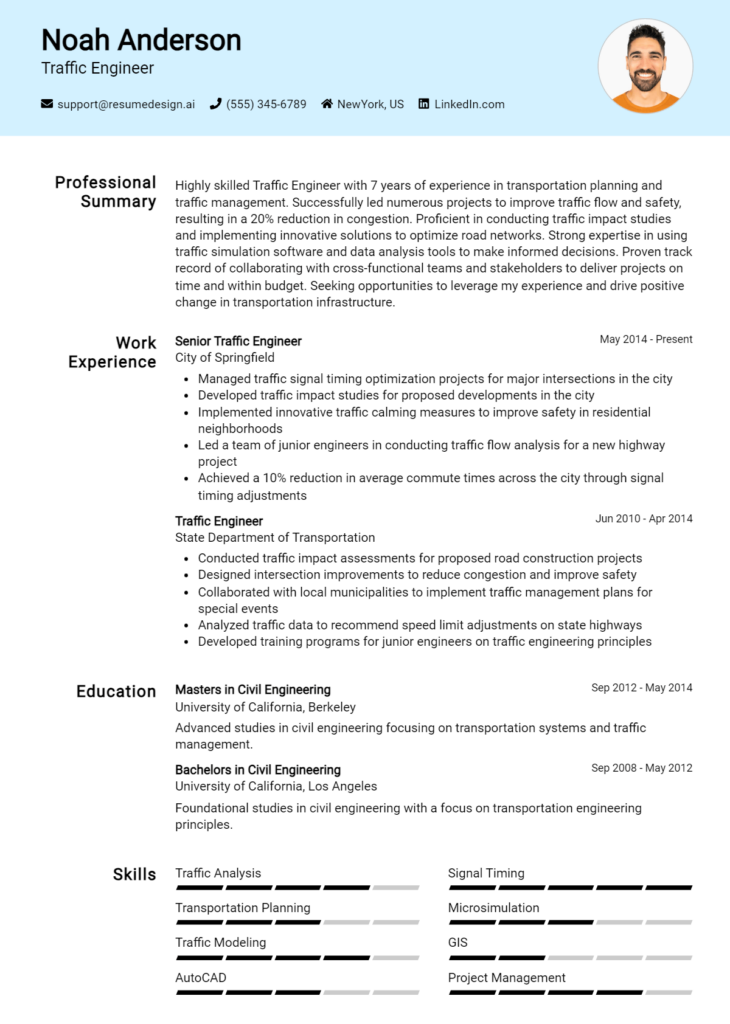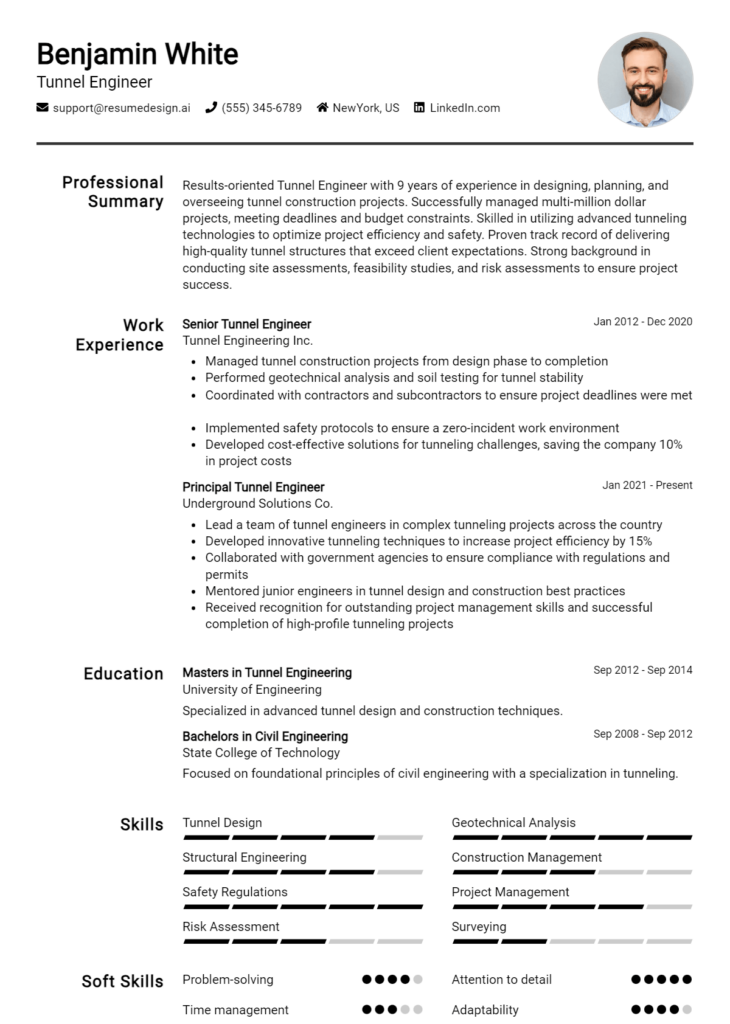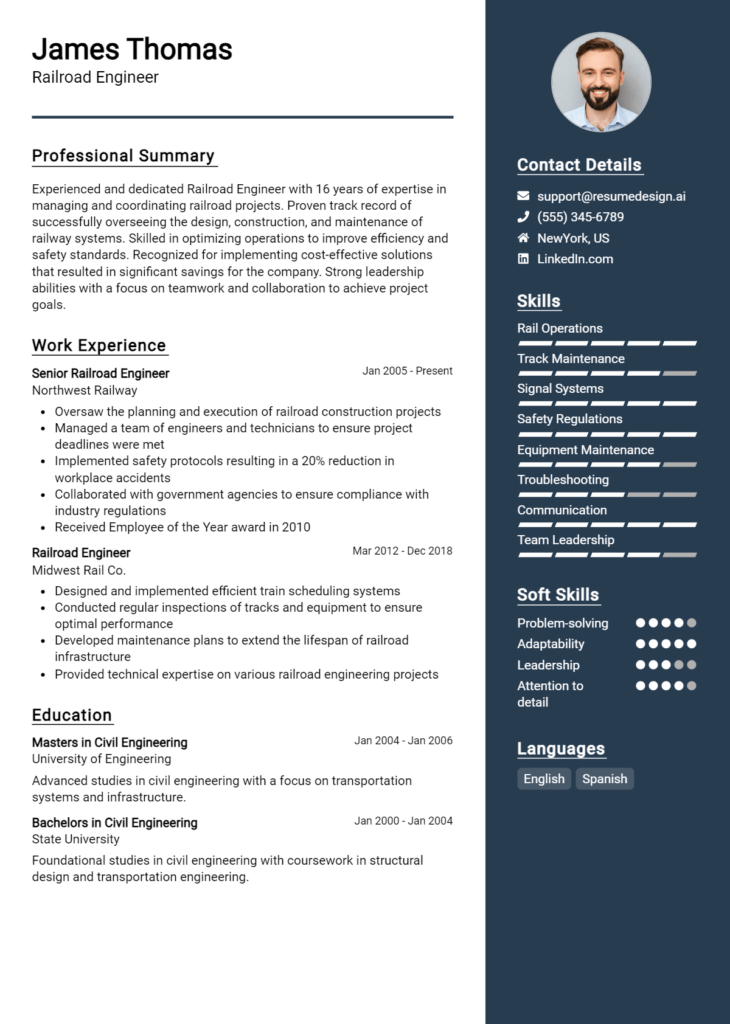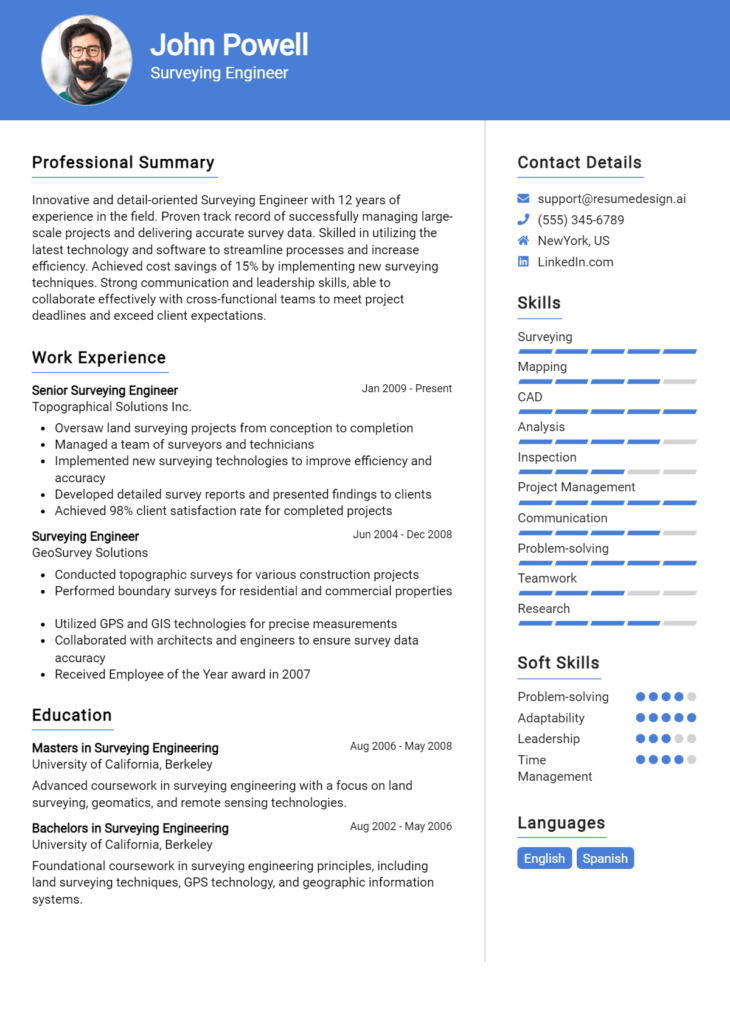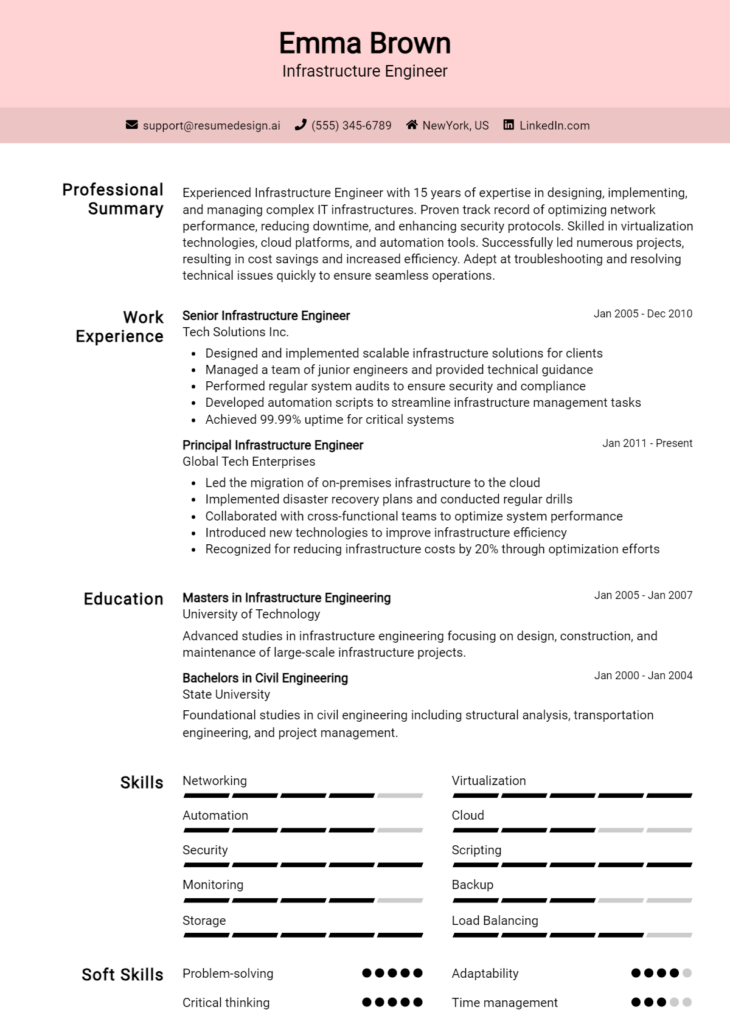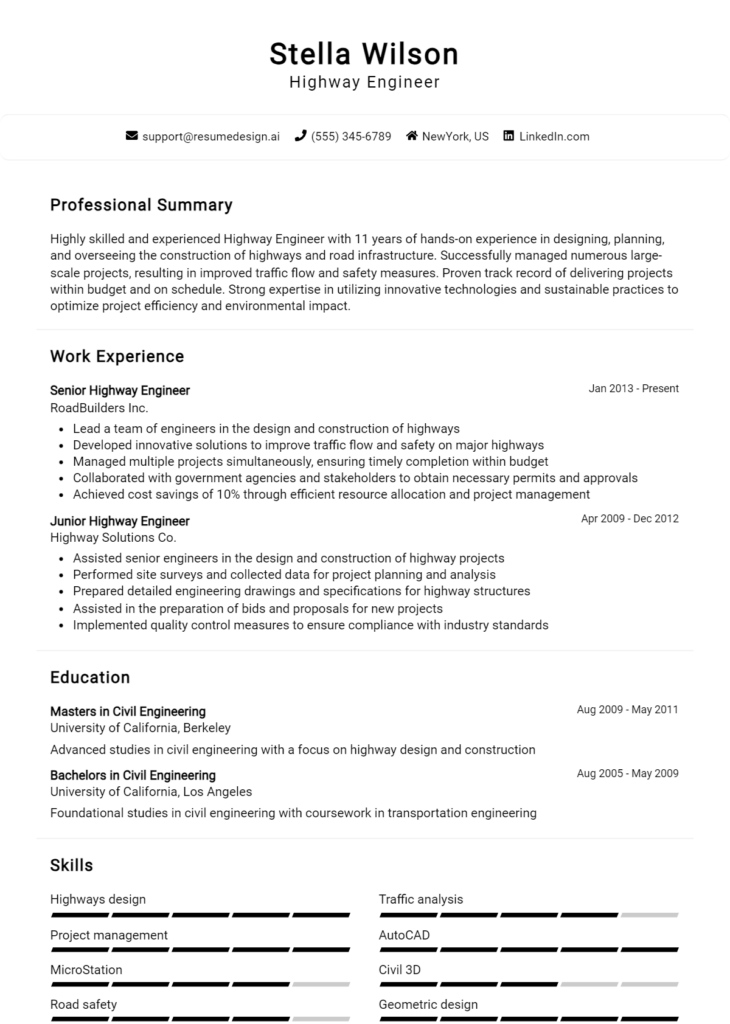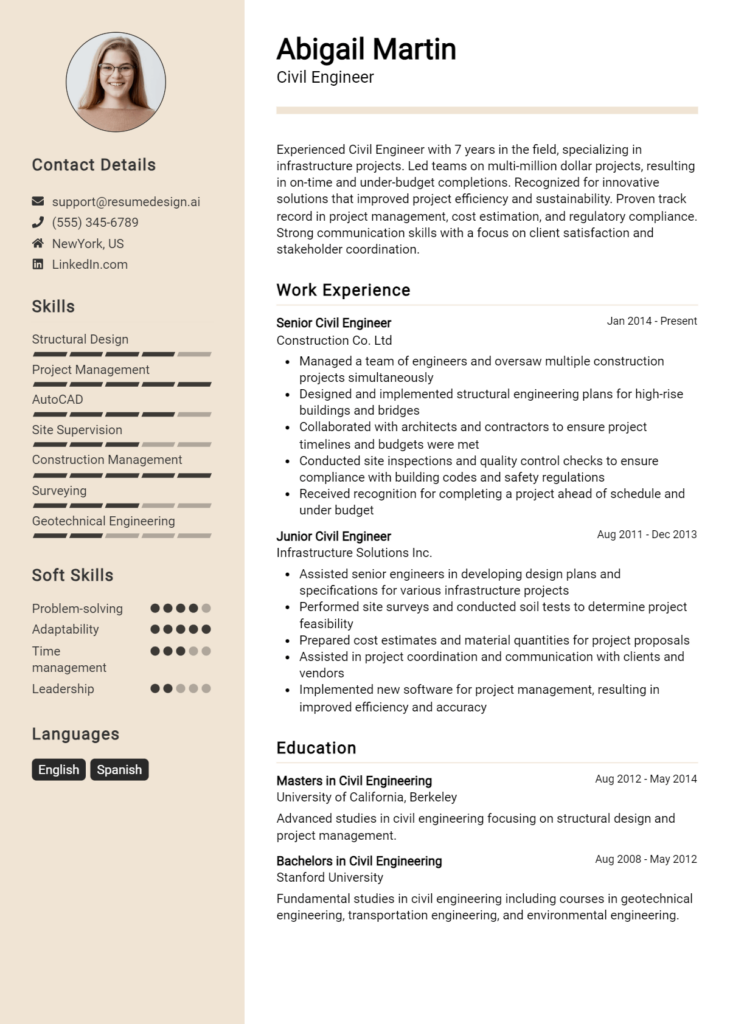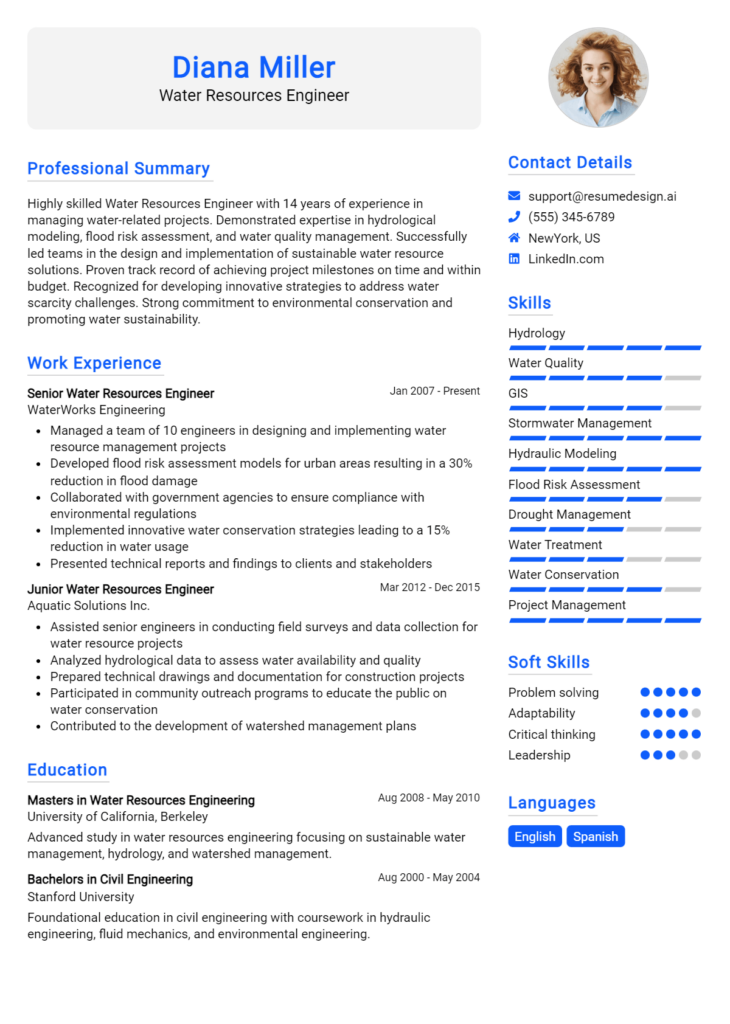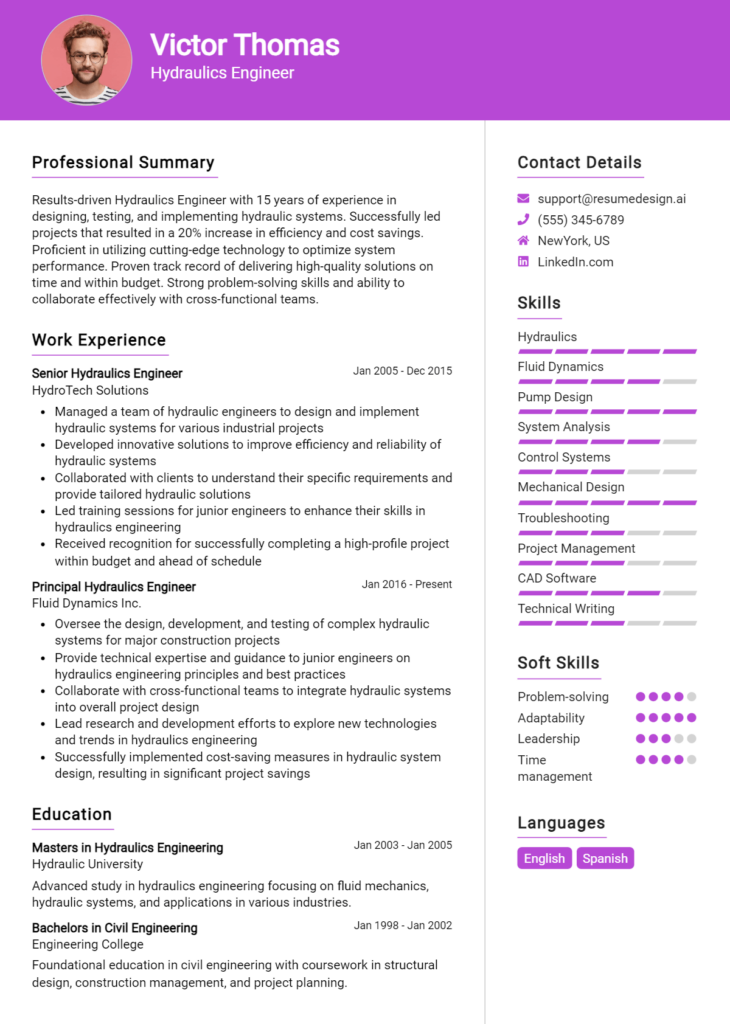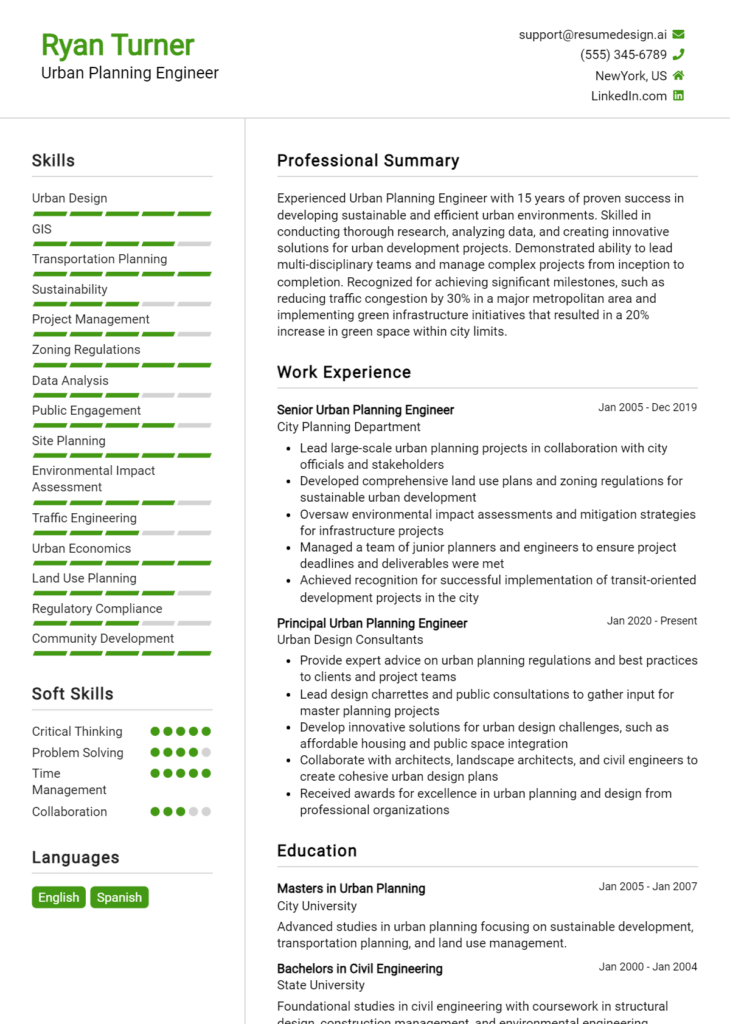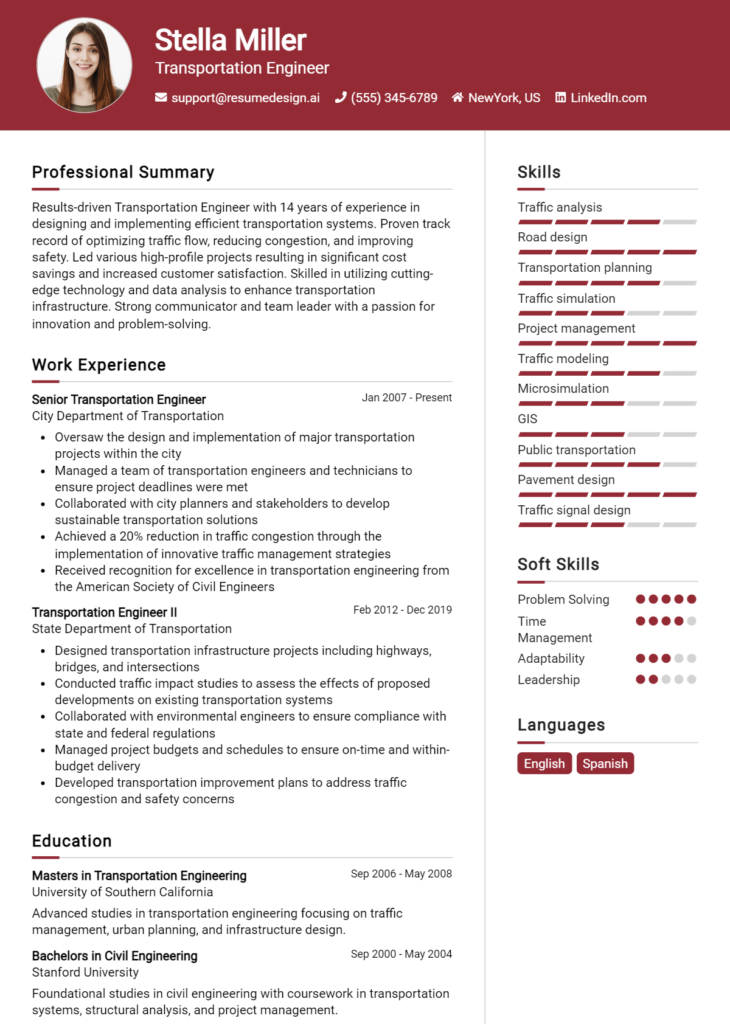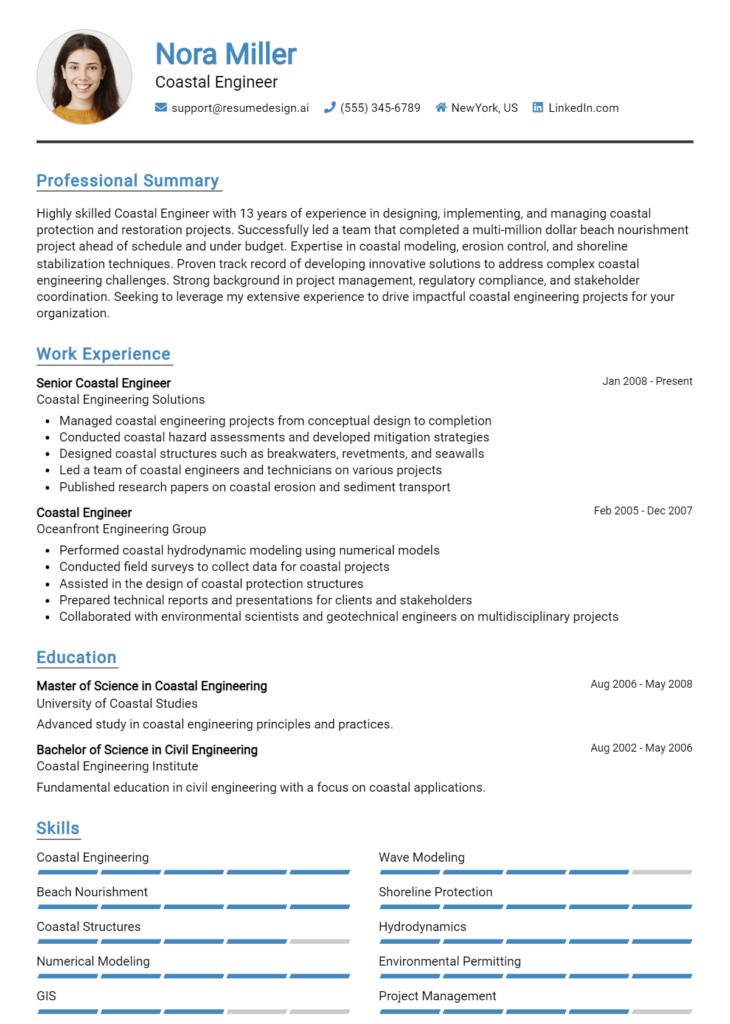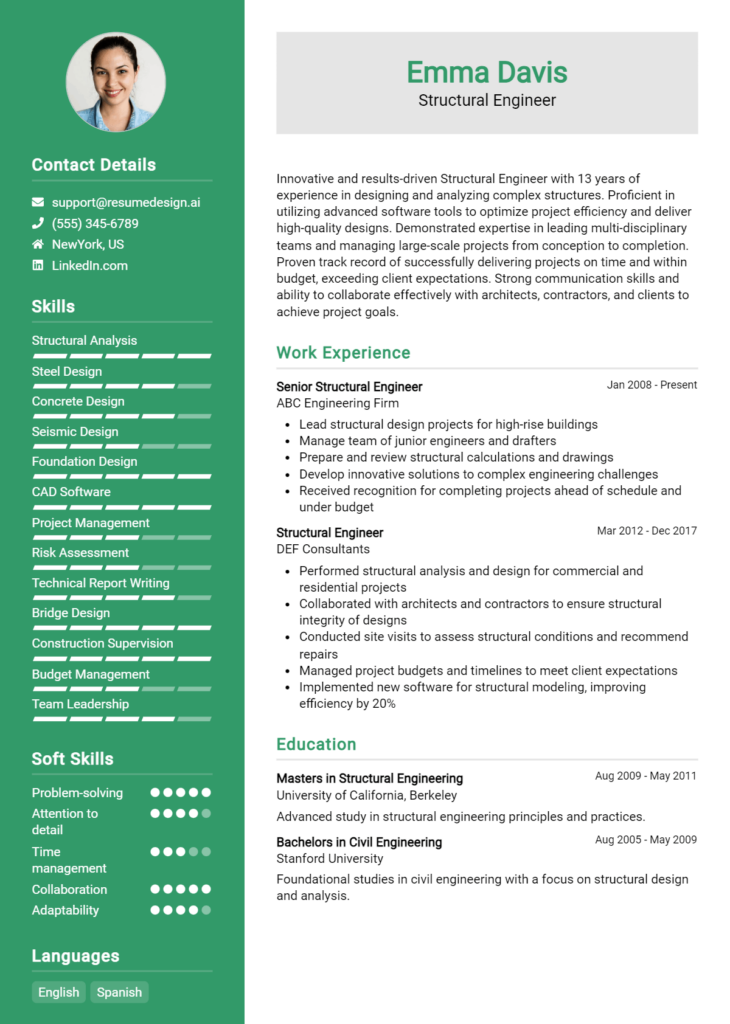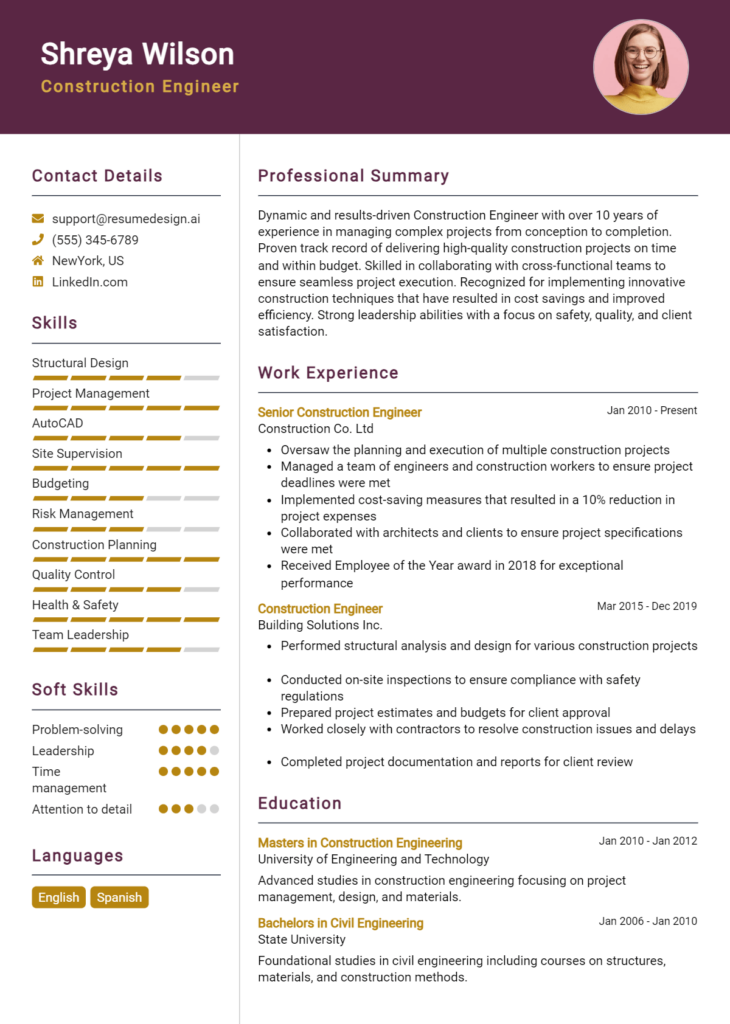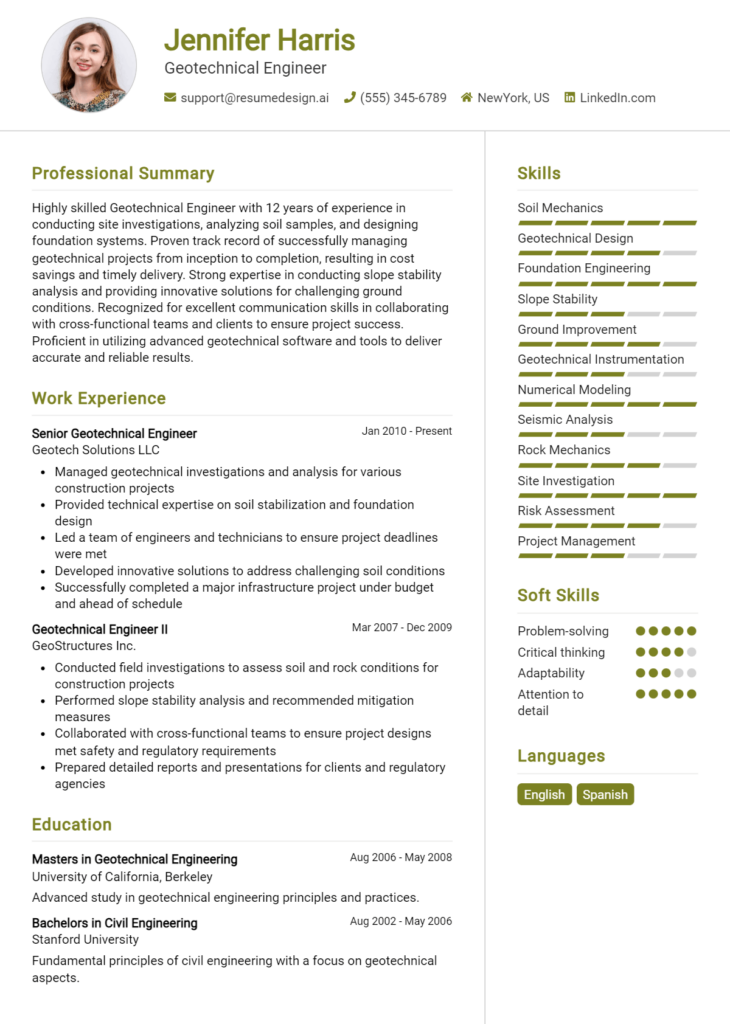Environmental Engineer Core Responsibilities
Environmental Engineers play a crucial role in promoting sustainability and ensuring compliance with environmental regulations. Their core responsibilities include designing systems to manage waste, analyzing environmental data, and developing strategies to minimize pollution. They collaborate across departments, requiring strong technical, operational, and problem-solving skills to address complex environmental challenges. These abilities are essential for achieving organizational goals and promoting eco-friendly practices. A well-structured resume effectively highlights these qualifications, showcasing the candidate's potential impact.
Common Responsibilities Listed on Environmental Engineer Resume
- Conduct environmental impact assessments and audits
- Design and implement waste management systems
- Develop strategies for pollution prevention and control
- Analyze data related to air, water, and soil quality
- Collaborate with regulatory agencies to ensure compliance
- Prepare technical reports and presentations for stakeholders
- Monitor and assess environmental remediation projects
- Advise on sustainable practices for resource management
- Conduct research to develop innovative environmental solutions
- Lead cross-functional teams in environmental projects
- Provide training and guidance on environmental regulations
- Evaluate new technologies for environmental protection
High-Level Resume Tips for Environmental Engineer Professionals
In the competitive field of environmental engineering, a well-crafted resume is not just a formality; it's your first chance to impress potential employers. Your resume serves as a critical marketing tool that showcases your unique blend of skills, qualifications, and achievements in a way that aligns with the demands of the position. It must effectively convey your technical expertise, project experience, and problem-solving capabilities to stand out among a pool of candidates. This guide will provide practical and actionable resume tips specifically tailored for environmental engineer professionals, ensuring that your first impression is a memorable one.
Top Resume Tips for Environmental Engineer Professionals
- Tailor your resume to match the job description, using keywords and phrases from the posting.
- Highlight relevant experience by organizing your professional history chronologically or functionally based on the job requirements.
- Quantify your achievements with specific metrics, such as project costs, timelines, or environmental impact reductions.
- Showcase industry-specific skills, including knowledge of environmental regulations, sustainability practices, and technical software.
- Include certifications and licenses relevant to the field, such as LEED accreditation or Professional Engineer (PE) status.
- Demonstrate your problem-solving abilities through examples of challenges you’ve faced and how you overcame them.
- Use action verbs to describe your responsibilities and accomplishments, making your contributions clear and impactful.
- Incorporate a summary statement that encapsulates your career goals and key qualifications in environmental engineering.
- Be concise and ensure your resume is easy to read, using bullet points and consistent formatting for clarity.
By implementing these tips, you can significantly enhance your resume and increase your chances of landing a job in the environmental engineering field. A polished and targeted resume not only highlights your qualifications but also demonstrates your commitment and professionalism, making you a more attractive candidate to potential employers.
Why Resume Headlines & Titles are Important for Environmental Engineer
In the competitive field of environmental engineering, a well-crafted resume headline or title serves as a critical first impression for hiring managers. These concise phrases encapsulate a candidate's core qualifications and expertise, allowing them to stand out in a crowded pool of applicants. A compelling headline can quickly grab attention, summarizing key skills or experiences that align with the job description. It is essential for the headline to be relevant and directly related to the position being applied for, ensuring that it resonates with the employer's needs and expectations.
Best Practices for Crafting Resume Headlines for Environmental Engineer
- Keep it concise: Aim for one impactful sentence or phrase.
- Be role-specific: Tailor your headline to reflect the specific environmental engineering position you are applying for.
- Highlight key strengths: Incorporate essential skills or accomplishments that set you apart.
- Use industry keywords: Include relevant terminology that aligns with the job description.
- Avoid jargon: Ensure that your headline is easily understood by a broad audience.
- Focus on results: Emphasize achievements or outcomes that demonstrate your impact in previous roles.
- Make it engaging: Use action verbs or strong adjectives to create a dynamic and memorable headline.
- Revise regularly: Update your headline to reflect new experiences or skills as you progress in your career.
Example Resume Headlines for Environmental Engineer
Strong Resume Headlines
Innovative Environmental Engineer with 5+ Years of Experience in Sustainable Design and Waste Management
Results-Driven Environmental Engineer Specializing in Air Quality Control and Compliance
Dedicated Environmental Engineer with Proven Track Record in Renewable Energy Projects
Dynamic Environmental Engineer Committed to Developing Eco-Friendly Solutions for Urban Planning
Weak Resume Headlines
Environmental Engineer Looking for a Job
Experienced Professional in Engineering
Engineer with a Background in Environmental Studies
The strong headlines are effective because they clearly communicate the candidate's specific skills and experiences, making them immediately relevant to hiring managers seeking qualified professionals. They utilize industry language and emphasize results, which can make a candidate more appealing. In contrast, the weak headlines fail to impress because they are vague and lack specificity, failing to convey the unique value or expertise of the candidate. By avoiding generic statements, applicants can create a more compelling narrative that draws the interest of potential employers.
Writing an Exceptional Environmental Engineer Resume Summary
A resume summary is a critical component for an Environmental Engineer's job application as it serves as the first impression for hiring managers. A strong summary quickly captures attention by succinctly highlighting the candidate's key skills, relevant experience, and notable accomplishments within the field. By providing a snapshot of the applicant's qualifications, the summary can effectively differentiate them from other candidates, making it essential to keep it concise, impactful, and tailored to the specific job being applied for.
Best Practices for Writing a Environmental Engineer Resume Summary
- Quantify Achievements: Use numbers to demonstrate the impact of your work, such as reducing waste by a certain percentage or overseeing projects with a specific budget.
- Focus on Skills: Highlight technical skills, such as knowledge of environmental regulations, data analysis, and project management.
- Tailor to the Job Description: Customize your summary for each application by aligning it with the requirements and responsibilities mentioned in the job posting.
- Be Concise: Aim for 2-4 sentences that deliver the most important information without unnecessary fluff.
- Use Action Verbs: Start sentences with strong action verbs to convey confidence and proactivity.
- Highlight Relevant Certifications: Mention any relevant certifications or licenses that enhance your credibility as an Environmental Engineer.
- Showcase Soft Skills: Include interpersonal skills like teamwork, communication, and problem-solving that are essential in collaborative environments.
- Maintain Professional Tone: Keep the language professional and avoid jargon that may not be understood by all hiring managers.
Example Environmental Engineer Resume Summaries
Strong Resume Summaries
Results-driven Environmental Engineer with over 5 years of experience in waste management and remediation projects, consistently achieving a 30% reduction in operational costs through innovative recycling processes and efficient resource management.
Dedicated Environmental Engineer with a proven track record of leading cross-functional teams to complete projects on time and under budget. Successfully managed a $2 million remediation project that improved water quality in affected areas by 45% within one year.
Passionate about sustainability, I possess expertise in environmental impact assessments and regulatory compliance. Developed a carbon footprint reduction strategy that resulted in a 20% decrease in emissions for a major manufacturing client, aligning with their sustainability goals.
Experienced Environmental Engineer skilled in GIS and environmental modeling, with a strong ability to analyze data and present findings to stakeholders. Spearheaded a project that improved air quality monitoring systems, resulting in a 15% increase in compliance with federal standards.
Weak Resume Summaries
I am an Environmental Engineer looking for a new opportunity where I can use my skills.
Environmental Engineer with some experience in various projects. I am a team player and can communicate well.
The examples of strong resume summaries are effective because they provide specific details, quantifiable results, and tailored skills relevant to the Environmental Engineer role. Each summary conveys a clear picture of the candidate's impact and expertise, making them stand out to hiring managers. In contrast, the weak summaries lack specificity and quantifiable achievements, making it difficult for employers to gauge the candidate's qualifications and contributions to potential projects.
Work Experience Section for Environmental Engineer Resume
The work experience section of an Environmental Engineer's resume is a critical component that serves to highlight the candidate's technical skills and their ability to manage teams effectively while delivering high-quality products. This section not only provides insight into the candidate's practical application of engineering principles but also demonstrates their capacity for collaboration across various disciplines. By quantifying achievements and aligning their experience with industry standards, candidates can present a compelling case for their suitability for the role, showcasing how their contributions have positively impacted projects and organizations.
Best Practices for Environmental Engineer Work Experience
- Clearly outline technical skills relevant to environmental engineering projects.
- Quantify achievements with specific metrics, such as cost savings or project completion timelines.
- Emphasize teamwork and collaboration in multi-disciplinary settings.
- Use action verbs to start each bullet point, showcasing initiative and leadership.
- Align experiences with industry standards and regulations to demonstrate compliance knowledge.
- Highlight any certifications or specialized training that enhance technical expertise.
- Tailor the work experience to match the job description for the position being applied for.
- Include relevant volunteer experiences or internships that show a commitment to environmental issues.
Example Work Experiences for Environmental Engineer
Strong Experiences
- Led a team of 5 engineers in the design and implementation of a wastewater treatment facility, achieving a 30% reduction in operational costs and improving compliance with EPA standards.
- Managed a project that successfully remediated a contaminated site, resulting in the restoration of 15 acres of land and a 40% increase in local biodiversity.
- Developed and executed a comprehensive environmental impact assessment for a large-scale construction project, ensuring adherence to state regulations and reducing potential fines by 25%.
- Collaborated with local government agencies to create a sustainable urban development plan, which was adopted as a model by three neighboring municipalities.
Weak Experiences
- Worked on various engineering projects.
- Assisted in environmental assessments.
- Participated in team meetings related to environmental issues.
- Contributed to reports and documentation for projects.
The examples categorized as strong experiences are considered effective because they provide specific details about the candidate's accomplishments, including quantifiable results and a clear demonstration of leadership and collaboration. In contrast, the weak experiences lack specificity and fail to showcase meaningful contributions or outcomes, making them less impactful in conveying the candidate's qualifications.
Education and Certifications Section for Environmental Engineer Resume
The education and certifications section of an Environmental Engineer resume is crucial in establishing the candidate's qualifications and expertise in the field. This section serves to highlight the academic background, industry-relevant certifications, and commitment to continuous learning efforts that are essential for a successful career in environmental engineering. By providing relevant coursework, specialized training, and recognized certifications, candidates can significantly enhance their credibility and demonstrate their alignment with the specific demands of the job role. A well-structured education and certifications section not only showcases the technical knowledge necessary for the position but also reflects dedication to ongoing professional development in a rapidly evolving industry.
Best Practices for Environmental Engineer Education and Certifications
- Prioritize relevant degrees such as Environmental Engineering, Civil Engineering, or related fields.
- Include specific certifications like the Engineer in Training (EIT) or the Professional Engineer (PE) license.
- List relevant coursework that directly pertains to environmental regulations, sustainability practices, or water resource management.
- Highlight any specialized training in software or tools commonly used in environmental engineering, such as AutoCAD or GIS.
- Ensure that the certifications are current and recognized within the industry to demonstrate credibility.
- Consider including professional development courses or workshops that showcase ongoing education and skills enhancement.
- Organize the section to emphasize the most relevant and advanced qualifications at the top.
- Use clear and concise language to convey qualifications effectively, avoiding unnecessary jargon.
Example Education and Certifications for Environmental Engineer
Strong Examples
- Bachelor of Science in Environmental Engineering, University of XYZ, 2020
- Certified Environmental Professional (CEP), 2021
- Relevant Coursework: Water Resources Management, Environmental Impact Assessment, and Sustainable Design.
- OSHA 40-Hour HAZWOPER Certification, 2022
Weak Examples
- Bachelor of Arts in History, University of ABC, 2015
- Certification in Basic First Aid, 2019
- Relevant Coursework: Introduction to Psychology, 2017
- Certification in Microsoft Office Suite, 2018
The examples are considered strong because they directly relate to the qualifications necessary for an Environmental Engineer, showcasing relevant degrees, certifications, and coursework that align with industry standards. In contrast, the weak examples demonstrate a lack of relevance to the field of environmental engineering, featuring outdated, unrelated, or overly general qualifications that do not contribute to the candidate's credibility in this specialized area.
Top Skills & Keywords for Environmental Engineer Resume
In the competitive field of environmental engineering, showcasing the right skills on your resume can significantly enhance your chances of securing a desirable position. Employers look for candidates who not only possess technical expertise but also exhibit strong interpersonal qualities that enable effective collaboration and problem-solving. A well-crafted resume should highlight both hard and soft skills, demonstrating a comprehensive understanding of environmental issues and the ability to implement sustainable solutions. By emphasizing these skills, you can articulate your value to potential employers and illustrate your readiness to tackle the complex challenges faced in this field.
Top Hard & Soft Skills for Environmental Engineer
Soft Skills
- Strong communication skills
- Team collaboration
- Problem-solving abilities
- Critical thinking
- Adaptability
- Project management
- Attention to detail
- Leadership skills
- Time management
- Conflict resolution
Hard Skills
- Environmental impact assessments
- Knowledge of environmental regulations (e.g., EPA standards)
- Geographic Information Systems (GIS) expertise
- Data analysis and modeling
- Water and wastewater treatment processes
- Air quality monitoring techniques
- Soil and groundwater remediation
- Sustainable design principles
- Technical report writing
- Proficiency in relevant software (e.g., AutoCAD, MATLAB)
By effectively showcasing your skills and relevant work experience, you can create a compelling resume that stands out to hiring managers in the environmental engineering sector.
Stand Out with a Winning Environmental Engineer Cover Letter
Dear [Hiring Manager's Name],
I am writing to express my enthusiasm for the Environmental Engineer position at [Company Name] as advertised on [where you found the job posting]. With a Bachelor’s degree in Environmental Engineering from [Your University] and over [X years] of hands-on experience in sustainable design and environmental remediation, I am excited about the opportunity to contribute to your team. My technical expertise combined with my passion for environmental advocacy aligns perfectly with [Company Name]'s commitment to developing innovative solutions for a sustainable future.
In my previous role at [Your Previous Company], I successfully led multiple projects focused on reducing waste and improving water quality in urban areas. By implementing advanced filtration systems and conducting comprehensive environmental impact assessments, I was able to reduce pollutants by [specific percentage or amount] and ensure compliance with local and federal regulations. I am adept at using simulation software and data analysis to predict environmental outcomes, which I believe would be valuable in managing [specific projects or goals relevant to the job] at [Company Name].
Furthermore, I have a strong track record of collaborating with multidisciplinary teams, including urban planners and environmental scientists, to develop comprehensive strategies that address complex environmental challenges. My experience in project management has honed my ability to oversee projects from inception to completion, ensuring timely delivery within budget constraints. I am eager to bring my innovative mindset and problem-solving skills to [Company Name] to help tackle the pressing environmental issues we face today.
Thank you for considering my application. I am looking forward to the opportunity to discuss how my skills and experiences align with the goals of [Company Name]. I believe my dedication to environmental sustainability and my technical acumen make me a strong candidate for this position. I am excited about the possibility of contributing to your esteemed organization and am available at your earliest convenience for an interview.
Sincerely,
[Your Name]
[Your Contact Information]
[LinkedIn Profile or Professional Website, if applicable]
Common Mistakes to Avoid in a Environmental Engineer Resume
Crafting a standout resume as an Environmental Engineer is crucial for securing job interviews in a competitive field. However, many candidates fall into common traps that can undermine their chances of making a strong impression. Understanding these pitfalls can improve your resume and enhance your appeal to potential employers. Here are some mistakes to avoid:
Using Generic Templates: Relying on generic resume templates can make your application blend into the crowd. Tailor your resume to reflect your unique skills and experiences relevant to the environmental engineering field.
Lack of Specificity: Failing to provide specific examples of your achievements can weaken your resume. Use quantifiable data and detailed descriptions to showcase how your work positively impacted projects or organizations.
Ignoring Keywords: Not incorporating industry-specific keywords can lead to your resume being overlooked by Applicant Tracking Systems (ATS). Research job descriptions and include relevant terms that align with the skills and qualifications sought by employers.
Overloading with Technical Jargon: While it's important to demonstrate technical expertise, overloading your resume with jargon can alienate readers who may not be familiar with specific terms. Aim for a balance that showcases your knowledge while remaining accessible.
Neglecting Soft Skills: Environmental engineering isn't solely about technical abilities. Ignoring soft skills, such as teamwork, communication, and problem-solving, can give a limited view of your capabilities. Highlight these skills to present a well-rounded profile.
Failing to Update Regularly: An outdated resume can signal to employers that you're not actively engaged in your career. Regularly update your resume to reflect new skills, certifications, and experiences that enhance your qualifications.
Poor Formatting and Organization: A cluttered or disorganized resume can be difficult to read and may lead to key information being missed. Use clear headings, bullet points, and consistent formatting to improve readability and make a lasting impression.
Omitting Relevant Certifications and Licenses: Not highlighting relevant certifications or licenses can diminish your credibility as an environmental engineer. Include any certifications, such as Professional Engineer (PE) or Leadership in Energy and Environmental Design (LEED), to bolster your qualifications.
Conclusion
As an Environmental Engineer, your role is crucial in tackling some of the most pressing issues facing our planet today. You are tasked with designing sustainable systems, managing waste, and ensuring compliance with environmental regulations. Key aspects of your work involve assessing environmental impacts, developing pollution control technologies, and promoting sustainable practices across various industries.
To effectively communicate your skills and experiences, it is essential to have a polished and professional resume that highlights your qualifications and achievements in the field. Remember to showcase your technical expertise, project management experience, and any certifications that demonstrate your commitment to environmental stewardship.
Now is the perfect time to review your Environmental Engineer resume. Ensure it reflects your most recent accomplishments and aligns with industry standards. If you're looking for inspiration or tools to enhance your resume, consider exploring the following resources:
- Resume Templates to help you get started with a professional layout.
- Resume Builder for an easy-to-use platform that guides you through the creation of your resume.
- Resume Examples to see how others in your field have successfully presented their experiences.
- Cover Letter Templates to complement your resume and make a strong impression on potential employers.
Take action today to refine your resume and stand out in the competitive field of environmental engineering!

